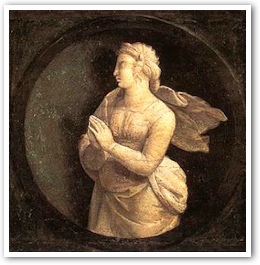Through Him All Things Were Made
- FR. KENNETH BAKER, S.J.
Have you ever wondered why the Church in her Nicene Creed says that the Father is the maker of heaven and earth, and then a few lines later says of the Lord Jesus that through him all things were made?
 |
A basic principle of Catholic understanding of the creative activity of God is that all things outside of God himself, that is, all things visible and invisible, are produced by the divine essence or substance and so are to be attributed equally to the three divine Persons. Thus the notion of creation can be said of all three Persons. But when the Nicene Creed proclaims that "through him all things were made", it is referring to the doctrine of the Son as God's "Word" and so is speaking about the inner divine life. Let me explain what I mean by this.
We know from the Prologue of St. John's Gospel in chapter 1 that Jesus of Nazareth is the Word of God. Of the Word St. John says that He is: 1) eternal, 2) personal, 3) divine, 4) creative. In fact, the words of the Creed we are now considering come right from John (1:3): "He (the Word) was in the beginning with God; all things were made through him, and without him was not anything made that was made."
The key word to notice here is the preposition "through". Since God is Spirit, his inner life reflects what we refer to as "knowing" and "willing". For the essence of any spirit is to know and to will. Any time we utter a word to another we must first have some idea of in our minds. And it is through our ideas that we both speak and make things. The carpenter must have an idea of the house he is going to build before he goes to work. It is through that idea, or by means of it that he is able to build the house. In a similar way, the Word of God is God's idea of himself. And the Word became flesh in Jesus of Nazareth.
The Word is consubstantial to the Father and therefore is equal to him in everything. Since God is Spirit, there is thinking in God. Thus, the Father is God as thinking and the Son is the same God as thought. The thought of God is called his "Word" and is identified with the essence of God.
Since the "Word" is God's thought, it is through that Word that God knows himself perfectly and all other things. Thus, if God freely wills to create or to produce something outside himself he will have to produce those things "through" his own Word or idea. For, since God is the infinite source or cause of all reality, he must know all things that could possibly exist either in this world or in any other thinkable world. However, it should be carefully noted that the knowledge of God is not like our knowledge. Our knowledge is produced in our minds by our contact with things that exist prior to us and independently of us. With God the situation is just the reverse. By knowing himself he knows all things. Since God knows things in his own essence and has willed that they should exist outside himself, they came into being. We must be careful not to think that God's knowledge is determined by creatures; for, if it were, that would mean that God was dependent on creatures for his knowledge of them. If that were so, God would not be God.
Where do such reflections lead us? They lead us to the conclusion that both the Father and the Son (the Word of God) are involved in creation. God the Father creates all things through the Word (Jn 1) who is his Son. The Jesus of the Gospels is the only Son of God. He is lovable and compassionate. But we should not forget that he is also our Creator our first beginning and last end.
See the index of chapters from Fundamentals of Catholicism which have been reprinted to CERC here.
 This is J. Fraser Field, Founder of CERC. I hope you appreciated this piece. We curate these articles especially for believers like you.
This is J. Fraser Field, Founder of CERC. I hope you appreciated this piece. We curate these articles especially for believers like you.
Please show your appreciation by making a $3 donation. CERC is entirely reader supported.

Acknowledgement
Kenneth Baker, S.J. "Through Him All Things Were Made." In Fundamentals of Catholicism Vol. 1 Chapter 15 (San Francisco: Ignatius Press, 1995), 52-54.
This article reprinted with permission from Father Kenneth Baker, S.J.
The Author

 Father Kenneth Baker, S.J., assumed editorship of Homiletic & Pastoral Review in April 1971 and remained in this position for almost forty years. In 1983 he published a three-volume explanation of the faith called Fundamentals of Catholicism Vol. 1, Creed and Commandments; Vol. 2, God, Trinity, Creation, Christ, Mary; and Vol. 3, Grace, the Church, the Sacraments, Eschatology
Father Kenneth Baker, S.J., assumed editorship of Homiletic & Pastoral Review in April 1971 and remained in this position for almost forty years. In 1983 he published a three-volume explanation of the faith called Fundamentals of Catholicism Vol. 1, Creed and Commandments; Vol. 2, God, Trinity, Creation, Christ, Mary; and Vol. 3, Grace, the Church, the Sacraments, Eschatology


